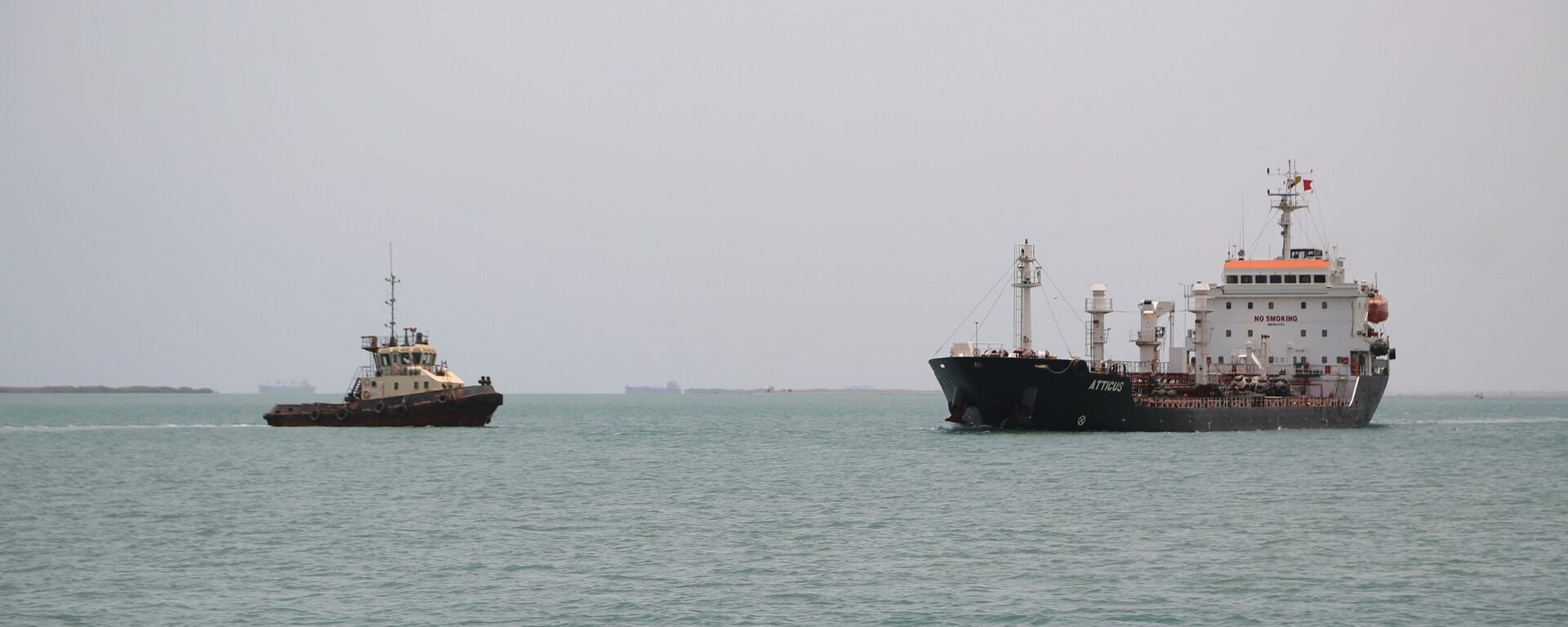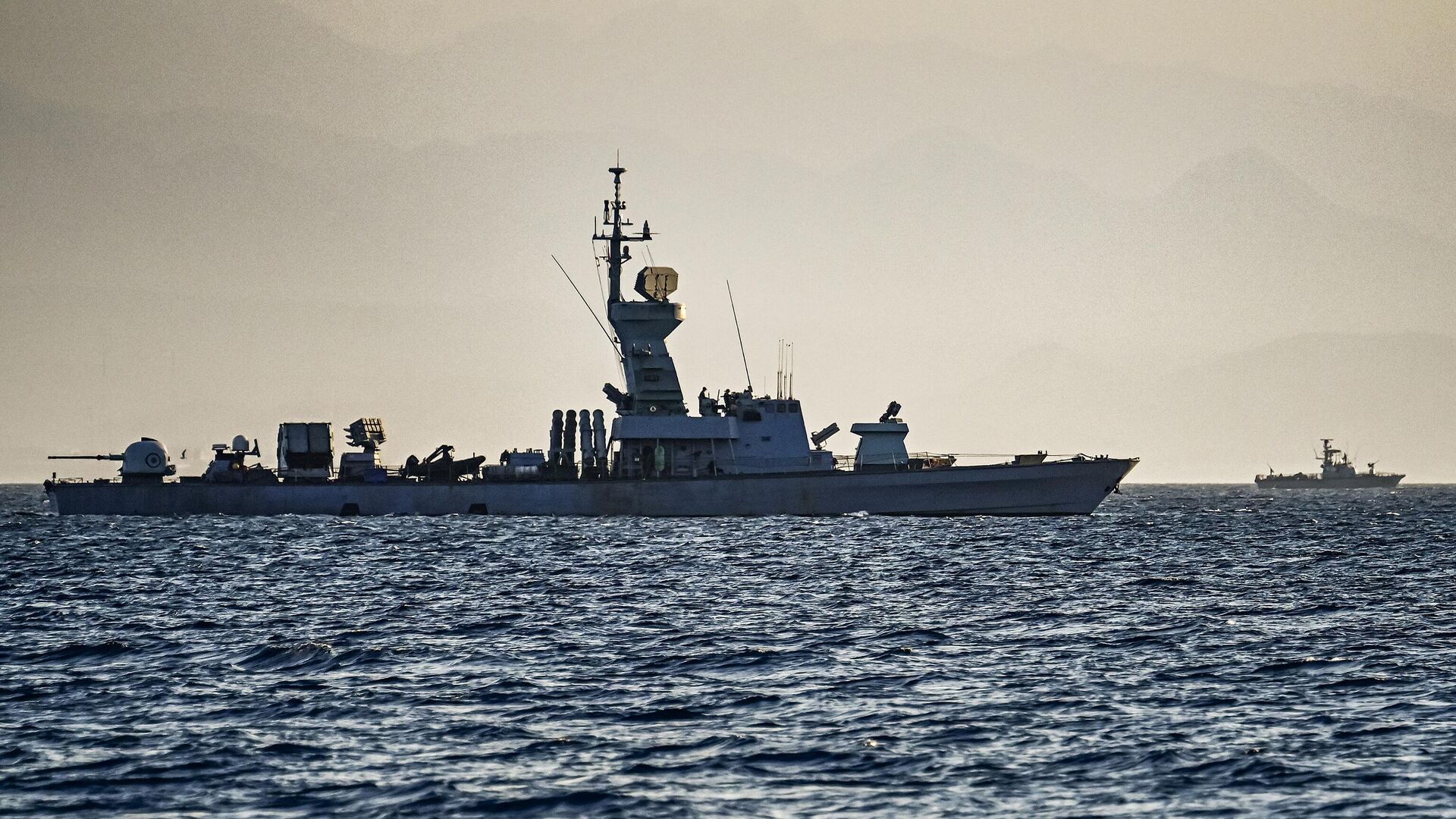https://sputnikglobe.com/20240120/how-could-red-sea-standoff-affect-oil-supplies--1116285141.html
How Could Red Sea Standoff Affect Oil Supplies?
How Could Red Sea Standoff Affect Oil Supplies?
Sputnik International
Ongoing Houthi attacks on Western trade vessels passing through the Red Sea have already prompted a spate of tankers to divert their course away from the area. Will the trend continue? Sputnik explores.
2024-01-20T09:32+0000
2024-01-20T09:32+0000
2024-01-20T09:32+0000
world
russia
us
united kingdom (uk)
israel
yemen
houthis
attacks
red sea
red sea crisis
https://cdn1.img.sputnikglobe.com/img/07e8/01/14/1116284984_0:0:3072:1728_1920x0_80_0_0_e8c3c73ae2781bc31903c508677ea103.jpg
Yemen's Houthis vowed to attack any ships associated with Israel until the Jewish state halts its military actions in the Gaza Strip in November.This prodded US Secretary of Defense Lloyd Austin to announce the creation of a multinational operation to secure navigation in the Red Sea. Earlier this month, US and UK forces launched major strikes against Houthi positions to degrade the fighters’ ability to target commercial vessels. The standoff, however, shows no sign of abating.Why is Red Sea So Crucial for Global Oil Deliveries?The Suez Canal and the Bab el-Mandeb Strait at either end of the sea are major routes for energy shipping. Tankers coming from Persian Gulf countries, such as Iraq and Saudi Arabia, travel through the Red Sea to reach Europe and beyond.Between 7 and 8 million barrels per day (bpd) of crude oil and petroleum products were previously transported via the Red Sea. Up to 12% of global crude exports, and between 14% and 15% of exports of oil products, such as gasoline and diesel, typically travel through the Red Sea, according to data provider Kpler.How Did Oil Prices Change?The prices of a barrel of Brent crude, the global oil benchmark, and West Texas Intermediate, the US oil benchmark, have barely moved since the beginning of the Red Sea tensions.Currently, US crude oil is trading about 73$ per barrel, as compared to average price tag of 82.49$ per barrel in 2023. Brent crude futures traded 1.4% lower at $77.21 per barrel, while US West Texas Intermediate crude futures were down 1.0% at $71.69.At the same time, he suggested that the Red Sea crisis will last "for months," which may bring the price of Brent to past $80 per barrel in the near future. Falakshahi didn’t rule out that the price tag could rise as high as $85 a barrel over the next few weeks, and that it would surge higher only if the standoff escalated significantly.Which Companies and Tankers Have Re-Routed?Even though recent weeks saw a whole array of tankers take a longer route to avoid the Red Sea, the vessels are still reaching their customers, Falakshahi pointed out.US energy giant Chevron has meanwhile continued transporting crude through the Red Sea thanks to what its Chief Executive Michael Wirth called his company’s close cooperation with the US Navy’s Fifth Fleet.In a separate development, the British oil major Shell suspended crude shipments through the Red Sea, about a month after British Petroleum (BP) paused transits across the region.Wirth, for his part, warned that the Red Sea standoff poses serious risks to oil flows and that prices could change quickly if tensions continue. He voiced surprise that US crude oil was trading at about 73$ a barrel because the "risks are very real" amid the ongoing US-Houthi skirmish in the Red Sea.Why are Russian Oil Shipments Unabated?Russia's crude flows have been unhindered by the Red Sea standoff amid an increase in the country’s oil shipments through the region, according to tanker-tracking data obtained by the Bloomberg news agency.Over the past four weeks, Russia’s crude shipments via the Red Sea have surged to around 3.43 million barrels per day, a 94,000-barrel increase in comparison with previous weeks, the data showed.Currently Russian crude continues to pass through the Red Sea despite Houthi attacks in the area. The Ansar Allah (Houthi) movement earlier pledged it would target neither Russian nor Chinese vessels.
https://sputnikglobe.com/20240114/us-jeopardizes-shipping-in-red-sea---hezbollah-secretary-general-1116159635.html
https://sputnikglobe.com/20240115/red-sea-tensions-sky-high-may-be-impossible-to-contain-soon---un-secretary-general-1116182002.html
https://sputnikglobe.com/20240116/american-losers-cant-pass-through-bab-el-mandeb-strait-yemens-houthis-say-1116201118.html
russia
united kingdom (uk)
israel
yemen
red sea
Sputnik International
feedback@sputniknews.com
+74956456601
MIA „Rossiya Segodnya“
2024
Oleg Burunov
https://cdn1.img.sputnikglobe.com/img/07e4/09/0b/1080424846_0:0:2048:2048_100x100_80_0_0_3d7b461f8a98586fa3fe739930816aea.jpg
Oleg Burunov
https://cdn1.img.sputnikglobe.com/img/07e4/09/0b/1080424846_0:0:2048:2048_100x100_80_0_0_3d7b461f8a98586fa3fe739930816aea.jpg
News
en_EN
Sputnik International
feedback@sputniknews.com
+74956456601
MIA „Rossiya Segodnya“
Sputnik International
feedback@sputniknews.com
+74956456601
MIA „Rossiya Segodnya“
Oleg Burunov
https://cdn1.img.sputnikglobe.com/img/07e4/09/0b/1080424846_0:0:2048:2048_100x100_80_0_0_3d7b461f8a98586fa3fe739930816aea.jpg
houthi attacks on western trade vessels passing through the red sea, houthus skirmish, oil supplies, oil tankers moving through red sea, red sea crisis
houthi attacks on western trade vessels passing through the red sea, houthus skirmish, oil supplies, oil tankers moving through red sea, red sea crisis
How Could Red Sea Standoff Affect Oil Supplies?
Ongoing Houthi attacks on Western trade vessels passing through the Red Sea have already prompted a spate of tankers to divert their course away from the area. Will the trend continue amid the current US-Houthi skirmish in the region? Sputnik explores.
Yemen's Houthis vowed to attack any ships associated with Israel until the Jewish state halts its military actions in
the Gaza Strip in November.
This prodded US Secretary of Defense Lloyd Austin to announce the creation of a multinational operation to secure navigation in the Red Sea. Earlier this month, US and UK forces launched
major strikes against Houthi positions to degrade the fighters’ ability to target commercial vessels. The standoff, however, shows no sign of abating.
Why is Red Sea So Crucial for Global Oil Deliveries?
The Suez Canal and the Bab el-Mandeb Strait at either end of the sea are major routes for energy shipping. Tankers coming from Persian Gulf countries, such as Iraq and Saudi Arabia, travel through the Red Sea to reach Europe and beyond.

14 January 2024, 15:26 GMT
Between 7 and 8 million barrels per day (bpd) of crude oil and petroleum products were previously transported via the Red Sea. Up to 12% of global crude exports, and between 14% and 15% of exports of oil products, such as gasoline and diesel, typically travel through the Red Sea, according to data provider Kpler.
The main alternative route to the Red Sea goes around Africa via the Cape of Good Hope, adding about two weeks to trips and potentially increasing shipping rates by as much as $1 a barrel for crude and $4 a barrel for refined products, Goldman Sachs' estimates have shown.
How Did Oil Prices Change?
The prices of a barrel of Brent crude, the global oil benchmark, and West Texas Intermediate, the US oil benchmark, have barely moved since the beginning of the Red Sea tensions.
Currently, US crude oil is trading about 73$ per barrel, as compared to average price tag of 82.49$ per barrel in 2023. Brent crude futures traded 1.4% lower at $77.21 per barrel, while US West Texas Intermediate crude futures were down 1.0% at $71.69.
"The [oil] market basically doesn’t get as excited as it used to because it knows that most of these tensions don’t really, necessarily, lead to a reduction in supply," Homayoun Falakshahi, a senior oil analyst at Kpler, told CNN.

15 January 2024, 17:29 GMT
At the same time, he suggested that the Red Sea crisis will last "for months," which may bring the price of Brent to past $80 per barrel in the near future. Falakshahi didn’t rule out that the price tag could rise as high as $85 a barrel over the next few weeks, and that it would surge higher only if the standoff escalated significantly.
Which Companies and Tankers Have Re-Routed?
Even though recent weeks saw a whole array of tankers take a longer route to avoid the Red Sea, the vessels are still reaching their customers, Falakshahi pointed out.
“It’s really mostly a crisis in the supply chain, we haven’t lost volumes [of oil]. You have some tankers that have to go around the Cape of Good Hope. But in the end, the volumes remain the same,” the analyst claimed.
US energy giant Chevron has meanwhile continued transporting crude through the Red Sea thanks to what its Chief Executive Michael Wirth called his company’s close cooperation with the US Navy’s Fifth Fleet.
In a separate development, the British oil major Shell suspended crude shipments through the Red Sea, about a month after British Petroleum (BP) paused transits across the region.
Wirth, for his part, warned that the Red Sea standoff poses serious risks to oil flows and that prices could change quickly if tensions continue. He voiced surprise that US crude oil was trading at about 73$ a barrel because
the "risks are very real" amid
the ongoing US-Houthi skirmish in the Red Sea.
"It’s a very serious situation and seems to be getting worse. So much of the world’s oil flows through that region that were it to be cut off, I think you could see things change very rapidly," Wirth argued.
Why are Russian Oil Shipments Unabated?
Russia's crude flows have been unhindered by the Red Sea standoff amid an increase in the country’s oil shipments through the region, according to tanker-tracking data obtained by the Bloomberg news agency.
Over the past four weeks, Russia’s crude shipments via the Red Sea have surged to around 3.43 million barrels per day, a 94,000-barrel increase in comparison with previous weeks, the data showed.

16 January 2024, 13:51 GMT
Currently Russian crude continues to pass through the Red Sea despite Houthi attacks in the area. The Ansar Allah (Houthi) movement earlier pledged it would target neither Russian nor Chinese vessels.
"Yemen’s Ansar Allah movement is attacking US and British ships in the Red Sea. As for all other countries, including Russia and China, their shipping is out of danger in the region," the movement’s spokesman Mohammed al-Bahiti told the Russian daily Izvestia. He underscored that the Houthis are ready to ensure the safe passage of Russian and Chinese ships via the Red Sea.






